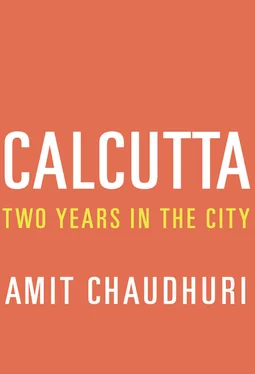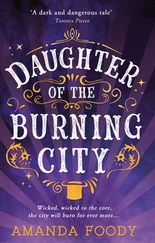In a way, I’m almost relieved he was born fifteen years too late to be where the big money is today. Only recently, I heard of how a biscuit company (unnamed, probably because of a legal injunction) was pressuring the central government to replace the free lunches it gives to poor schoolchildren with biscuit packets. The government would have happily given in had there not been an outcry. I shudder to think of my father involved in such a scheme today, although everything I’ve known about him makes it seem unlikely. Is it not better that he lived in an age when he could be at once optimistic and righteously angry about the need to deregulate the market? The leisurely progress of his vascular dementia means that he’s aware of his family, of Calcutta, of India, and of his Britannia pension, but at several removes. Vascular dementia precludes the absolute blankness of Alzheimer’s; it’s a gentle slope descending into oblivion.
I arrived in Dubai after midnight, nervous about missing my connecting flight. It would depart at 2 a.m. Passing through security for the second time in nine hours, rehearsing the whole belt-discarding, shoe-and-wallet-jettisoning routine with a bunch of Indians, Bangladeshis, Pakistanis, and Europeans, I plunged into the capitalist wakefulness that’s Dubai airport. What was I doing here? Going back to Calcutta, of course. Ever since British Airways terminated its meagre ration of thrice-weekly flights in 2009, travelling back from the United Kingdom necessarily involves a stopover in some part of the ancient world — in some resplendent metropolis in the middle of a desert. I’d been in London, in the South Bank, for a few days of an unusually warm spring; on the third day, I’d just about begun to find my feet in British time, and now, on the fourth, was struggling to rediscover Calcutta time in Dubai. As I tried to follow the clock’s forward leap, walking very quickly on the concourse, I made sure to buy some chocolate, and pick up a box of dates.
Assembly elections had been taking place in India during my absence, phase by phase, over April and May, and one of the consequences was going to be new governments in at least some states. Most states changed governments every five or ten years. The non-ideological alliances of compromise and mutual opportunity have proved, since the nineties, to be surprisingly resilient. There has been, famously, a democratisation of politics, an embrace of not only grandiloquent low-caste anarchists like Lalu Prasad Yadav and Dalit dictator manqués like Mayawati, but of an array of disquieting hustlers who are reportedly no less depraved than the polite Nehru-jacketed secular sorts from the Congress. In West Bengal, of course, there had been no alteration for thirty-four years; the electorate, steadfast at first, then increasingly hapless, had voted the Left Front into power seven times. The old bhadralok Marxists had been going in and out of Writers’ Building in their white dhutis and panjabis like Roman senators in their togas, casually unmindful of the barbarians sizing up the gates. Although the Front had incurred heavy losses a couple of years ago in the general elections, and Mamata Banerjee’s great vision — the vision of decisively booting the Front out — was not just a possibility but the most credible outcome, the CPI(M) was no longer persuaded of the barbarians’ success. Even Nirupam Sen, never a toga-wearing type, had, as I pointed out earlier, sounded sceptical about an easy majority for the Trinamool — as the Roman in 476 C.E. might have been narrow-eyedly dismissive of Odoacer’s prospects. It was to this Bengal I flew back on 22nd April.
The London-to-Dubai flight had been uncomfortably full, despite the aircraft being the gigantic A380. Next to me was an Asian couple of Muslim origin (I could tell from the names by which they affectionately addressed each other, and the repeated use of “inshallah” in their London English), but British in identity, excited by their journey towards India, where they’d never been, and their imminent vacation in Kerala — a green, water-drenched idyll, but also, coincidentally, a CPI(M) bastion. The woman watched Hindi films, now with indulgent familiarity, as if she were surprised to be reprising her life in her Wembley drawing room, now with proprietary boredom (I had a sense she was viewing some of them a second time), and, whenever she was distracted from the storyline, matter-of-factly consulted the pages of Hello! magazine. She nudged her partner and invited his response frequently; he replied with the colloquial immediacy of a man who has an opinion on everything. “Look, it’s him ,” she said, upon seeing Hrithik Roshan, or “That’s her,” on viewing Bipasha Basu, with the intimacy reserved for things one has only ever encountered in books and pictures; while he shared these sightings avidly. She wanted confirmation as to whether Kate Middleton was really that beautiful; on the other hand, she was genuinely astonished at how slim she was. I eavesdropped, read, spied on my neighbours, watched a film, slept a little.
The Dubai to Calcutta flight, in comparison, possessed a dimly lit provincialism you encounter all the time in Dhakuria, Jodhpur Park, Lake Town, and Salt Lake. It was a smaller aircraft, three quarters full. My neighbour was a twenty-eight-year-old man. He worked in Leeds for Tata Consultancy Services, which was doing cheap software programming for the British government. He’d got on to a flight from Manchester, reached Dubai half an hour late at 1 a.m., worried, as I had, about making it to this plane, and now leaned back. Adults, like children, will forget trauma with ease, and live gratefully for the most part in the present. This, at least, is how people who have anything to do with Bengal approach existence: frontally, with a narrow focus. This man’s father had had a second cerebral stroke at the age of sixty-four, which is why he was on his way to visit him at this odd time of the year — neither summer nor Christmas — for ten days. It was a relatively early age to have had two strokes, and I quizzed him about it, given my own father’s tendency to have “mini strokes.” But my father is eighty-nine. It turned out that his, among other things, was a schoolteacher. Arriving into Calcutta’s heat, he’d take a train to Kalyani, the small town in which his parents lived, on the day, 23rd April, that Kalyani voted. “What do you think will happen?” I asked him. “There seems little doubt that there will be a ‘paribartan,’ ” he said, giggling — there was something elusively feminine about him — guiltily delighting in the word that had been put into currency in the last two years.
He not only represented the Bengal of the last three decades, he was it. Intelligence and marginality marked him equally — the moderate privileges he’d grown up with in Kalyani, and the most he’d made of them — as well as that delicate, androgynous fussiness. I recalled the Left Front’s scrapping of English from state-funded primary schools in 1983, a decision reversed only two years ago. Nirupam Sen and I had discussed this: why the dropping of English at that stage should diminish excellence. After all, Sen himself was clearly from an English-as-second-language background; so was my father and the great memoirist and English prose stylist Nirad C. Chaudhuri — they’d both grown up in East Bengal before Independence, and my father, who would startle me by quoting Eliot’s “Prufrock” and Shelley’s “Ode to a Skylark,” began his education in a paathshala , an immemorial village school. Class, then, was not a reason for once choosing Bengali over English primary education; nationalism might have been. Tagore too belonged to this extraordinary English-as-a-second-language set, and was always diffident about his command of the language, hated English lessons, and confessed how he found it difficult to distinguish between the pronunciation of “worm” and “warm”—a not uncommon Bengali problem. Was it today’s state education itself, then, rather than the early absence of English, that was to blame for the working class’s sense of deprivation; or was it the encroaching tide of globalisation, which recognised no other language, and to which Bengal had capitulated later than almost anywhere else but Cuba? Anyway, the legacy of that twenty-seven-year-old policy was audible in my neighbour’s inflected English speech, which we continued to have recourse to until we gave up the pretence of being generalised, pan-Indian individuals, and confessed to each other we were Bengali. We continued talking of Calcutta, how it made flying hard work. Part agitated yokel, I narrated stories of flights out of Bombay and Delhi, how two British Airways planes depart each day from these cities, not to mention competitors like Jet Airways, Virgin, and Air India — and yet the flights to London are always bustling, the business class section not only chock-a-block with the Indian rich and their children but (I’ve noticed on occasion) their children’s nannies, self-conscious and reticent once the infants have gone to sleep. Exhausted, like hitch-hikers on an interminable highway, we fell asleep, dazed by memories of parents and intimations of better places.
Читать дальше












